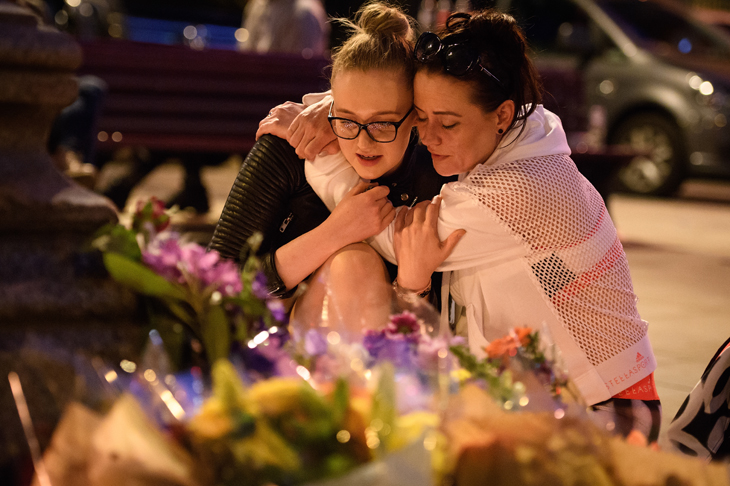In most parts of the world, we have now supped so full of terrorist horrors that the death of 22 people in such a terrible way does not feel decisively worse than what has gone before. You can tell this by the rather pro forma things that politicians say to condemn the attacks. Yet again, the attack is described as ‘cowardly’. This is simply untrue: it must require immense, though repellent, courage to blow yourself up. The other word to avoid is ‘innocent’. It is a word naturally, and rightly, applied to children, but it carries the dangerous implication that some terror attacks might be aimed at the ‘guilty’, and therefore be more forgivable. The word ‘innocent’ is never applied to our police and armed forces, but they are innocent, and killing those who keep the peace is, if anything, worse for all of us than killing ‘innocent’ civilians.
Alexander Chancellor ended up living between a couple of Inigo Jones pavilions, so it was fitting that his memorial service on Tuesday took place in Inigo Jones’s church, St Paul’s Covent Garden. The architecture fitted his open, easy manner: he wasn’t a Gothic sort of person. Because Alexander was upper-class and seemingly shambolic, much written, when he died, about his editorship of The Spectator played up the ‘gentleman amateur’ picture. The speakers in the service rightly corrected this. Ferdinand Mount, in particular, emphasised how exactingly professional Alexander was as editor. He almost never made rulings about ‘taste or doctrine’, said Mount, but he could always spot shortcomings in ‘style, grace or logic’. This is quite right. I would add ‘clarity’ too. Alexander’s own style was a model of clarity — never waffling, overelaborate or obfuscatory. So he could make other people’s prose pellucid, rather as a good physiotherapist uses a gentle touch to right something that is out of joint. In any work, you always respect a boss who shows, by little things, that he knows the trade.
In the above item, I have taken Alexander’s part in what Ferdy Mount said was the only fierce argument the two men had in 60 years of friendship — whether a full stop should appear before or after inverted commas at the end of a sentence. Ferdy held that it must always be included in the inversion, Alexander that it depended on the sense. So Ferdy would have written ‘style, grace or logic.’ Spectator readers will wish to take sides.
One is all too used, at memorial services and funerals, to seeing friends who have grown markedly older. But scientific advance (see Notes, 7 November 2015) now means that some — mainly women — seem to have grown younger. When people have ‘work’ done nowadays it is often so good that one only knows it has happened by comparing the ‘before and after’. One can no longer see the join. We cannot be far off the time — it has already happened in America — when it will be considered a matter of common politeness to have cosmetic treatments, for much the same reason as people are encouraged to wash and brush their hair.
At the service, the vicar told us we should feel free to clap each aria, tribute or reading. This was a friendly thought, but a mistake. If you are invited to clap in church, you feel it would be pointed not to. And you cannot clap some more than others, so clapping becomes obligatory and breaks the flow. There is reason in the long Protestant tradition of not clapping in church.
Sad to say, I cannot, so far as I know, claim kinship with Roger Moore, who has died. But it was a minor highlight of my country childhood when my father received, at his office, a letter addressed simply to ‘R. Moore, London’. It said: ‘We are two Swedish girls and we would very much like to meet you.’ Too modest, he understood he was not the intended recipient, and failed to pursue the matter. My mother, whose name is Ann, was once asked to be on the cover of the Radio Times. Being a tougher nut than my father, she immediately accepted, thinking that it might be because of her work as a Liberal county councillor. When the BBC realised that she was not Ann Moore, the then famous showjumper, they tried to beat a retreat with the ‘Well, perhaps another time’ line. I was proud of the way she did not make it easy for them.
Got something to add? Join the discussion and comment below.
Get 10 issues for just $10
Subscribe to The Spectator Australia today for the next 10 magazine issues, plus full online access, for just $10.
You might disagree with half of it, but you’ll enjoy reading all of it. Try your first month for free, then just $2 a week for the remainder of your first year.















Comments
Don't miss out
Join the conversation with other Spectator Australia readers. Subscribe to leave a comment.
SUBSCRIBEAlready a subscriber? Log in